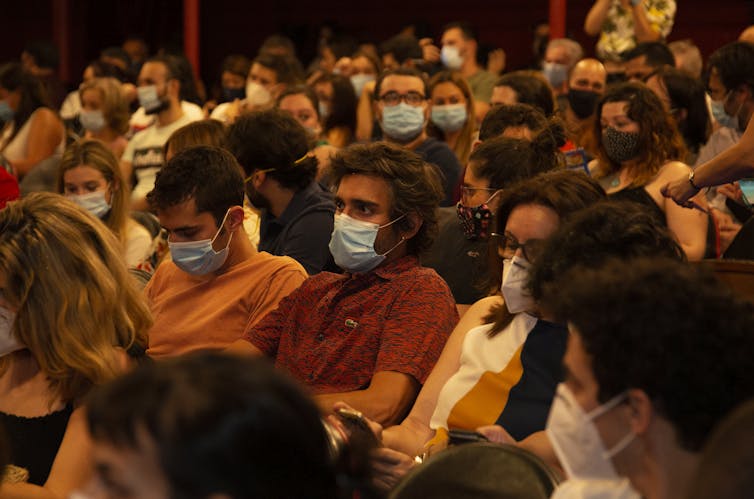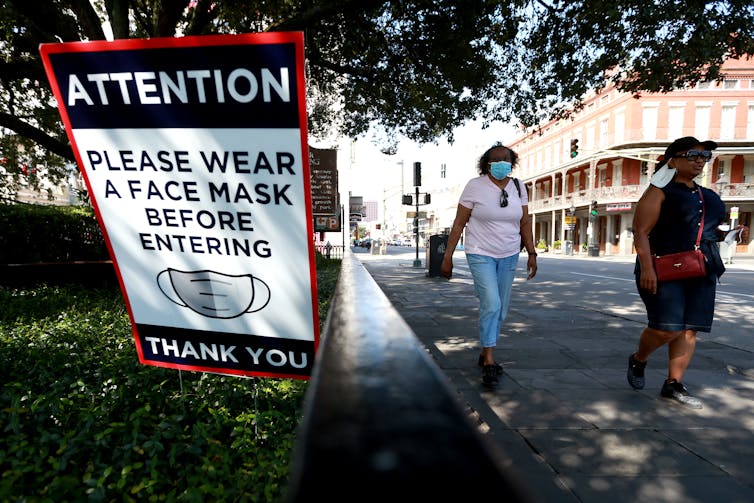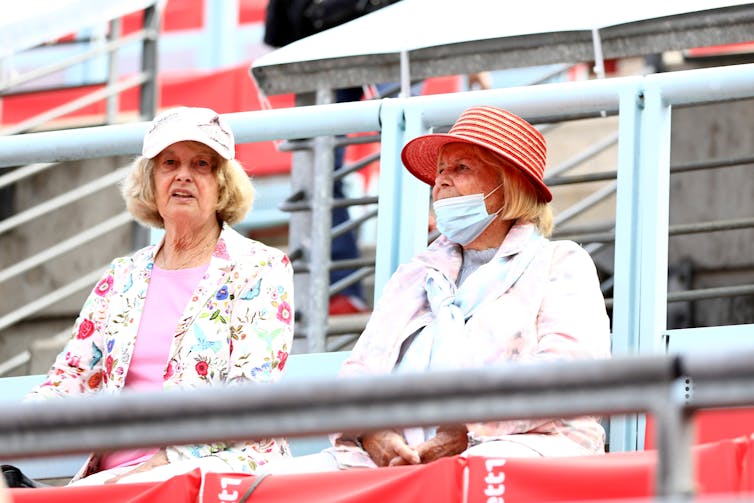
Patricia J. Garcinuno/Getty Images Entertainment via Getty Images Europe
Alex Horenstein, University of Miami and Konrad Grabiszewski, Prince Mohammad Bin Salman College (MBSC) of Business & Entrepreneurship
Governments all around the world are trying to contain the spread of the coronavirus. Making it mandatory for people to wear face masks is a policy that has gained favor among many national governments and state authorities in the United States.
Yet any policy that attempts to modify people’s behavior — in this case, making mask-wearing a new norm — needs to take into account undesired behavioral adjustments that the policy may bring about. As behavioral economists, we know that without such consideration, the policy is bound to be less efficient than expected.
Here are two behavior alterations to look out for as mask-wearing becomes more commonplace.

Sean Gardner/Getty Images News via Getty Images North America
Wearing masks, not washing hands
When things get safer, people adjust their behavior and act more recklessly. This phenomenon, called the Peltzman effect, has been documented in areas as diverse as driving, sports and financial markets, as well as in drug overdose and pregnancy prevention.
The mechanism is always the same: A safety measure (a seat belt in the case of driving or a government bailout in the case of investing) allows the recipient to take more risk (driving faster or investing in more risky instruments). In the end, the behavior becomes less responsible. In fact, a safety measure can make the activity more dangerous.
It’s easy to imagine how this could be the case with COVID-19 and face masks. Here, going into public spaces is an activity with an associated risk of getting infected. A face mask is a safety measure that is meant to decrease the probability of infection.
But the Peltzman effect will have a detrimental effect on that probability: When people feel safer with a face mask, they ease off on other forms of prevention, such as carefully washing their hands or keeping social distance. In the worst case, the risk of infection could actually increase.
Behaviorial science suggests, then, that making face masks mandatory must be accompanied by policies that maintain, if not increase, other forms of prevention. In particular, it’s important to educate the public that, on its own, a face mask is not going to prevent COVID-19 if people forget about practices like social distancing and washing hands.
One could imagine a policy that makes not only face masks but also portable hand sanitizer mandatory. Public health education could work on turning mandatory face masks into visual reminders to wash hands frequently.
Wearing masks, not staying home
The Peltzman effect does not paint a complete story of how safety measures change individuals’ behavior.
In our research, we discovered another phenomenon: Safety measures encourage the participation of those who, without these measures, would sit out the activity as too risky for them.
For example, most people would not dare to join a NASCAR race or put their money in complex financial investments. These activities are just too risky. However, you might change your mind if accompanied by a professional NASCAR driver, making the race less dangerous, or if assured of a government bailout, making investing less risky. The safety measure becomes an invitation to participate.

Michael Hundt/AFP via Getty Images
In the case of the COVID-19 pandemic, this phenomenon translates into the following problem. Equipped with face masks and a misleading feeling of safety, those who otherwise should stay home — especially older folks and those with underlying illness — head out and about. Compared to the safety of home, they’d be exposed to a higher risk of infection.
The solution here requires public health messaging to walk a fine line. Making face masks mandatory must be accompanied by education that face masks are imperfect protection against COVID-19. Masks vary greatly in their filtration efficiency. Leaving home in a face mask does not mean that the probability of infection has been reduced to zero. It is of paramount importance to educate those at higher risk of coronavirus infection.
Whether governments should make face masks mandatory is a question of medical science and political will — and not one we even try to answer. But research in behavioral economics does anticipate the complex ways people may respond to such a policy and we suggest some ways to address them.![]()
Alex Horenstein, Assistant Professor of Economics, University of Miami and Konrad Grabiszewski, Associate Professor of Economics, Prince Mohammad Bin Salman College (MBSC) of Business & Entrepreneurship
This article is republished from The Conversation under a Creative Commons license.

